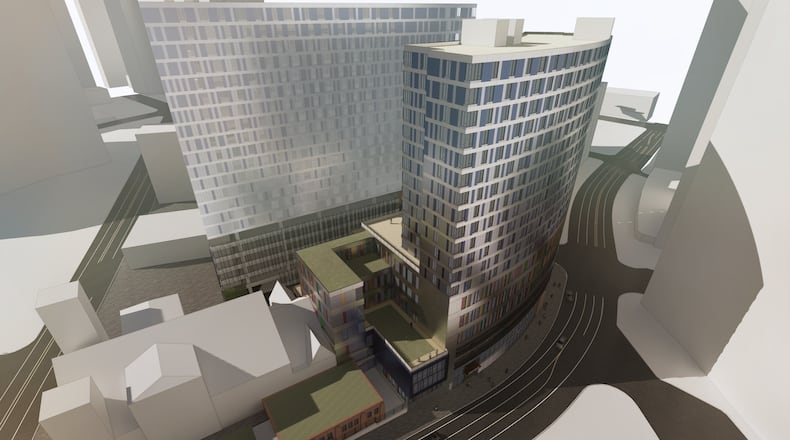One of downtown Atlanta’s oldest churches is moving forward with an ambitious plan to provide hundreds of affordable homes and educate children in need.
Atlanta First United Methodist Church recently began the first permitting phase for its mixed-income housing project at 360 Peachtree Street, which also includes two schools and retail space. The project’s centerpiece is a 20-story residential tower that will rise above the 120-year-old gothic church, curving alongside Ivan Allen Boulevard.
The initiative has been touted as monumental by Mayor Andre Dickens, who aims to create or preserve 20,000 affordable homes by 2030. It’s also part of a larger effort among more than a dozen faith-based organizations in Atlanta to build 1,000 affordable homes on land owned by places of worship.
Credit: Miguel Martinez for The Atlanta Journal-Constitution
Credit: Miguel Martinez for The Atlanta Journal-Constitution
Atlanta First UMC lead pastor Rev. Jasmine R. Smothers calls it a “God-sized vision” to provide much-needed affordable housing in Atlanta’s core.
“That’s a pretty tall order for a real estate developer to take on,” said David Brock, who is with project developer Evergreen Real Estates Services. “But I get her meaning, which is that the project has to be more than just the building. It’s really trying to become a community anchor.”
The project’s genesis began nearly five years ago. Atlanta First UMC began exploring ways to use 1.8 acres of its downtown campus, most of which housed parking lots rather than people. A ceremonial groundbreaking was held in 2022, but Brock said skyrocketing construction costs and high interest rates presented unexpected challenges.
The entire project — including a second phase consisting of another mixed-income residential high-rise — was originally estimated to cost $140 million. But Chicago-based Evergreen now anticipates it will take $125 million to deliver just the first phase.
“It takes a lot in the best of times and in normal circumstances to pull this together,” he said. “... We’ve tried to keep the faith.”
Credit: Courtesy Moody Nolan
Credit: Courtesy Moody Nolan
Last week, the development team filed for land development and demolition permits, which were first reported by Urbanize Atlanta. The applications reveal the residential tower will include 170 units, about 2,250 square feet of retail space and a 72-space parking deck. To trim costs, Brock said some parts of the building’s structure will be steel rather than concrete.
Smothers said 85% of the apartments will be reserved at below-market rates for residents making between 30% and 80% of the area median income. For example, a family of four will need an annual household income at or below $81,680 to qualify for an 80% AMI unit, while that requirement drops to $30,630 for a 30% AMI unit.
The project also includes nearly 65,000 square feet of education space for Atlanta First Day School and a tuition-free school for homeless children, Smother said.
“It’s creative, innovative and flexible space so that the community can make the best use of what we’re offering downtown Atlanta,” she said in an email. “Atlanta has never seen anything like it!”
Credit: Courtesy Moody Nolan
Credit: Courtesy Moody Nolan
Brock said the development team, which includes Atlanta-based architecture firms Moody Nolan and Goode Van Slyke, aims to begin construction over the summer. It will likely take two years to finish phase one.
Details on the second tower are still being finalized, but Brock said the scale of the development could be transformational for this part of downtown.
“It’s the right thing to do for the neighborhood,” he said.
About the Author
Keep Reading
The Latest
Featured





